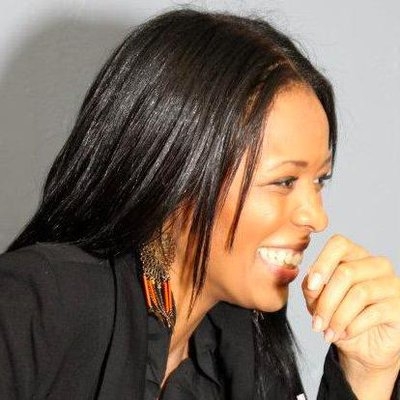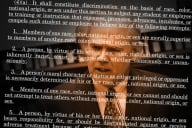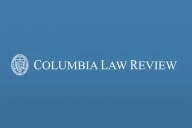You have /5 articles left.
Sign up for a free account or log in.

Saida Grundy
Incoming professor makes controversial remarks about a group of people on Twitter. The university initially backs the professor’s right to free speech but quickly distances itself somewhat from said remarks. The case probably sounds familiar to anyone following free speech issues in higher education, but it’s not that of Steven Salaita at the University of Illinois at Urbana-Champaign. Rather, this recent Twitter controversy involves a new faculty hire at Boston University, and free speech scholars are waiting to see what, if anything, the university does next.
First, some background. On Friday, Fox News ran a report about Saida Grundy, an incoming assistant professor of sociology and African-American studies at Boston University. The report revolved around Grundy’s tweets about race, collected in recent months and posted at SoCawlege.com, a conservative blog about college life. Some of the more controversial posts attributed to Grundy include one from March asking, “Why is white america [sic] so reluctant to identify white college males as a problem population?” Another from January allegedly says, “Every [Martin Luther King Jr.] week I commit myself to not spending a dime in white-owned businesses. And every year [I] find it nearly impossible.” At the end of April, capping off a multitweet conversation about the uniqueness of European slavery, Grundy allegedly wrote, “in other words, deal with your white sh*t [sic], white people. Slavery is a *YALL* thing.”
Imagine the condemnation, SoCawlege wrote in its commentary, “if a white person made the reverse statement, that college-aged black males are a ‘problem population’ that black America has to address… Why are young white males a singled-out issue to you, Ms. Grundy, as opposed to all young males? If you are going to work at Boston University, you have to teach college aged white males eventually, no?” (Note: This story has been updated to reflect the accurate spelling of SoCawlege.)
When news about the Twitter comments first broke, Colin Riley, a Boston University spokesman, said that the posts came from Grundy’s personal Twitter account and that she was therefore “exercising her right to free speech and we respect her right to do so.”
But after receiving negative feedback from alumni about its position, the university reportedly sought to amend its statement. Riley told Fox News on Saturday that the university “does not condone racism or bigotry in any form and we are deeply saddened when anyone makes such offensive statements.” But he still supported her right to free speech over all. Grundy’s collection of tweets “constitutes her opinion and we must recognize her right to have that opinion whether we agree or not,” Riley said.
The report included statements from Boston alumni saying they’d written to the university condemning its initial support for Grundy’s speech and, in one case, pledging never to donate to the university. On Twitter, threads about the case included such comments as: "Just in: #BostonUniversity prof. Saida Grundy apologizes! … Just kidding. She hates white people and she's still proud of it. #SaidaGrundy."
There's also substantial support for Grundy under #ISupportSaida.
On Monday, in an email to Inside Higher Ed, Riley wrote: “Here’s what we’ve said: while individuals have the right to hold and express personal opinions, BU does not condone racism or bigotry in any form. We’re offended by such statements.” Riley did not respond to follow-up questions, such as whether the university plans any action on the matter.
Grundy did not return requests for comment. Her Twitter account is now private. The chair of the sociology department did not return a request for comment, while Gene Jarrett, associate dean of the faculty for humanities and professor of English and African-American studies, referred questions back to Riley.
While the Grundy situation has some similarities to Salaita's, it’s of course too early to tell where, if anywhere, Grundy’s will go. Still, the case piqued the interest of free speech scholars and advocates.
Robert Shibley, executive director of the Foundation for Individual Rights in Education, said he suspected Grundy’s case will end here but that “experience has taught me to fear” otherwise.
The tweets that have been made public “certainly constitute protected speech under the First Amendment,” Shibley said. But one of Boston’s computing policies, which prohibits the dissemination of “offensive, annoying or harassing material,” he added, “arguably allows the university to punish her, should she decide to tweet similar things over the university network and should someone find her opinion ‘annoying.’”
That computer-speech policy, Shibley said, “should be revised to be consistent with BU's promise of ‘an atmosphere of unfettered free inquiry and exposition’ for its professors.” Of course, since Boston is a private institution, it doesn't have to follow First Amendment standards, necessarily, just contractual ones -- even if FIRE and others think it should.
But what about the concerns that Grundy’s position may make her biased against white male students, and therefore affect her teaching? John Wilson, co-editor of the American Association of University Professors’ "Academe" blog and an independent scholar of academic freedom, called such an argument -- which he said was used against Salaita by Illinois -- “utterly wrong.”
“If you say that alleged bigotry expressed in personal remarks disqualifies a professor from teaching, then virtually all professors would need to be fired,” he said. “Faculty who oppose gay marriage would be biased against [gay, lesbian, bisexual and transgender] students. Faculty who criticize Islamic terrorism would be biased against Muslim students. Faculty who are fundamentalist Christians and believe that atheists, Jews, etc. will be condemned to eternal hell might be feared by Jewish or non-Christian students. Faculty who criticize Israel or Palestine might be biased.”
The only way to know, Wilson added, "whether Grundy's classes are taught with an illegitimate bias that violates the rights of her students is by looking at her teaching, not her tweets. But you can't assume that controversial professors are bad teachers. Quite the opposite is usually true.”
At the same time, he said, Boston should be free to criticize Grundy’s tweets, as long as it makes clear she won’t be penalized in any way for them.
Legally speaking, the courts would probably be less sympathetic to Grundy’s free speech. Michael H. LeRoy, a professor of labor and employment relations and law at the University of Illinois at Urbana-Champaign, recently published a paper based on his database of 209 federal and state court cases brought by faculty members alleging violations of their First Amendment rights. LeRoy found that 73 percent of the time, the courts sided with the institutions (the overwhelming majority were public).
“They usually rule that a school’s interest in promoting inclusion outweighs a faculty member’s interest in expressing a viewpoint that others find offensive,” LeRoy said; most commonly, the cases involved faculty members accused of harassing speech by female students or faculty members who said it created a hostile learning or work environment. And given that Boston is a private and not a public institution, Grundy’s First Amendment claims would be more limited than, say, Salaita’s.
Interestingly, not a single decided case thus far involves Twitter. LeRoy said he suspected that might start to change, starting with Salaita’s ongoing lawsuit against Illinois.
“My published study concludes that Twitter’s compressed communication format accentuates sensational expressions -- but leaves no room for proof, nuance, qualification or subtlety -- the very qualities that elevate academic thought over uneducated discourse,” LeRoy elaborated via email. “This, in turn, raises the hard-to-answer question: Are all tweets covered by academic freedom?”
For LeRoy, the answer is no. "There is a growing disconnect between academe and courts," he said. "Many professors view academic speech as an unbounded concept. Courts, more often than not, uphold institutional sanctions against faculty members whose speech creates harm for a campus."









